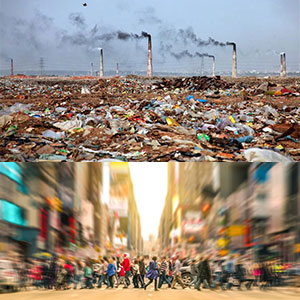Environmental Impact of our Health Care System on Public Health
 Blog by Ann Blake PhD, Environmental Advisor,
Blog by Ann Blake PhD, Environmental Advisor,
NewGen Surgical.
An article highlighting the environmental impact of our health care system on public health recently crossed my desk. My work as an environmental and public health consultant focuses on understanding the environmental impact of products and systems across many economic sectors. I took particular notice of this article because of my work with NewGen Surgical which highlights that the intensive use of products and resources in the work of health care can have a direct impact on both their patients and neighboring communities.
The article, Environmental Impacts of the US Health Care System and Effects on Public Health, a research article by Matthew J. Eckelman and Jodi Sherman points out that there are both direct and indirect health impacts of the US Healthcare system. The Healthcare Industry contributes to approximately 18% of the Gross Domestic Product (GDP). What many don’t know is how much this industry and its industrial activities contribute to population-wide negative health impacts. It is estimated that health burdens associated with the healthcare sector emissions, estimated at 8% of the US total, are commensurate with the 44,000 – 98,000 people who die in hospitals each year as a result of preventable errors.
Understanding where the environmental and subsequent health related impacts are coming from is the first step in identifying opportunities for improvement. The article in Plos One looks at not only the direct impact from health care facilities but also the indirect impact of emissions and negative environmental impacts of the supply chain and provides a context for a focus on environmental stewardship.
Companies like NewGen Surgical that are designing products with sustainable materials and a lower embedded energy help reduce the overall negative environmental impact of the healthcare sector. NewGen Surgical demonstrates that companies supplying the healthcare sector need to have a directed effort to lower their carbon emissions and chemical footprint for themselves and their entire supply chain. It is encouraging to see both work being done by smaller innovative companies taking a pioneering dive into safer materials, and I see the potential impact large scale companies can have by looking at their water usage, energy and transportation – all of it working together in one industry working to stay true to the idea of Healthcare Without Harm.

Ann Blake, Ph.D. is on the NewGen Surgical Advisory, with concentration on Environmental & Public Health. An independent consultant with over 23 years of experience finding safer alternatives to industrial chemicals in global manufacturing, Dr. Blake works with governments, occupational health, public health, environmental advocates, and companies to find viable alternatives to toxic chemicals in manufacturing and consumer products.
Dr. Blake has been published on numerous occasions, and along with Mark Rossi, PhD, co-director of Clean Production Action co-authored the Plastics Scorecard V1.0: Evaluating the Chemical Footprint of Plastics: offering the first comprehensive method for assessing and reducing chemicals of high concern in plastics.